
Asia is Earth's largest and most populous continent, located primarily in the Eastern and Northern Hemispheres. It shares the continental landmass of Eurasia with the continent of Europe, and the continental landmass of Afro-Eurasia with Africa and Europe. Asia covers an area of 44,579,000 square kilometres (17,212,000 sq mi), about 30% of Earth's total land area and 8.7% of the Earth's total surface area. The continent, which has long been home to the majority of the human population, was the site of many of the first civilizations. Its 4.7 billion people constitutes roughly 60% of the world's population.

China, officially the People's Republic of China, is a country in East Asia. It is the world's most populous country, with a population of more than 1.4 billion. China spans five geographical time zones and borders 14 different countries, the second most of any country in the world after Russia. Covering an area of approximately 9.6 million square kilometers (3,700,000 sq mi), it is the world's third or fourth largest country. The country consists of 23 provinces, five autonomous regions, four municipalities, and two Special Administrative Regions. The national capital is Beijing.

The Communist Party of China (CPC), informally the Chinese Communist Party (CCP), is the founding and sole ruling party of the People's Republic of China (PRC). The CCP was founded in 1921 by Chen Duxiu and Li Dazhao, and in 1949 under the leadership of Chairman Mao Zedong the party emerged victorious in the Chinese Civil War against the Kuomintang. Since 1949, the CCP has governed China as the leader of the United Front coalition with eight other parties, and has sole control over the People's Liberation Army (PLA). Today the party constitution upholds Marxism–Leninism, Mao Zedong Thought, socialism with Chinese characteristics, Deng Xiaoping Theory, the Three Represents, the Scientific Outlook on Development, and Xi Jinping Thought. As of 2021, the CCP has more than 95 million members, making it the second largest political party in the world after India's Bharatiya Janata Party.

Hong Kong, officially the Hong Kong Special Administrative Region of the People's Republic of China (HKSAR), is a city and special administrative region of China on the eastern Pearl River Delta in South China. With over 7.5 million residents of various nationalities in a 1,104-square-kilometre (426 sq mi) territory, Hong Kong is one of the most densely populated places in the world. Hong Kong is also one of the most developed cities in the world.

The Korean War was a war fought between North Korea and South Korea from 1950 to 1953. The war began on 25 June 1950 when North Korea invaded South Korea following clashes along the border and rebellions in South Korea. North Korea was supported by China and the Soviet Union while South Korea was supported by the United Nations, principally the United States. The fighting ended with an armistice on 27 July 1953.
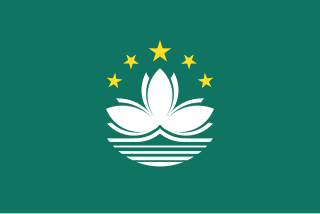
Macau or Macao, officially the Macao Special Administrative Region of the People's Republic of China (MSAR), is a city and special administrative region of the People's Republic of China in the western Pearl River Delta by the South China Sea. With a population of about 680,000 and an area of 32.9 km2 (12.7 sq mi), it is the most densely populated region in the world.

Mao Zedong, also known as Chairman Mao, was a Chinese communist revolutionary who was the founder of the People's Republic of China (PRC), which he ruled as the chairman of the Chinese Communist Party from the establishment of the PRC in 1949 until his death in 1976. Ideologically a Marxist–Leninist, his theories, military strategies, and political policies are collectively known as Maoism.

Taiwan, officially the Republic of China (ROC), is a country in East Asia. It sits at the junction of the East and South China Seas in the northwestern Pacific Ocean, neighboring the People's Republic of China (PRC) to the northwest, Japan to the northeast, and the Philippines to the south. The territories controlled by the ROC consists of 168 islands with a combined area of 36,193 square kilometres (13,974 sq mi). The main island of Taiwan, formerly known as Formosa, has an area of 35,808 square kilometres (13,826 sq mi), with mountain ranges dominating the eastern two-thirds and plains in the western third, where its highly urbanised population is concentrated. The capital is Taipei, which, along with New Taipei City and Keelung, forms the largest metropolitan area of Taiwan. Other major cities include Kaohsiung, Taichung, Tainan, and Taoyuan. With 23.45 million inhabitants, Taiwan is among the most densely populated countries in the world.

Shanghai is one of the four direct-administered municipalities of the People's Republic of China. The city is located on the southern estuary of the Yangtze River, with the Huangpu River flowing through it. With a population of 24.87 million as of 2020, Shanghai is the most populous urban area in China and the most populous city proper in the world. It is the only city in East Asia with a GDP greater than its corresponding capital. As of 2018, the Greater Shanghai metropolitan area, which includes Suzhou, Wuxi, Nantong, Ningbo, Jiaxing, Zhoushan, and Huzhou, was estimated to produce a gross metropolitan product (nominal) of nearly 9.1 trillion RMB. Shanghai has been one of the world's major centers for finance, business and economics, research, education, science and technology, manufacturing, tourism, culture, dining, art, fashion, sports, and transportation, and the Port of Shanghai is the world's busiest container port. As of 2019, the Shanghai Pudong International Airport was one of the world's top 10th-busiest airport by passenger traffics, and one of the two international airports serving the Shanghai metropolitan area, the other one being the Shanghai Hongqiao International Airport.
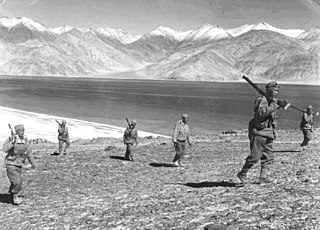
The Sino-Indian War between China and India occurred in October–November 1962. A disputed Himalayan border was the main cause of the war. There had been a series of violent border skirmishes between the two countries after the 1959 Tibetan uprising, when India granted asylum to the Dalai Lama. India initiated a defensive Forward Policy from 1960 to hinder Chinese military patrols and logistics, in which it placed outposts along the border, including several north of the McMahon Line, the eastern portion of the Line of Actual Control proclaimed by Chinese Premier Zhou Enlai in 1959.
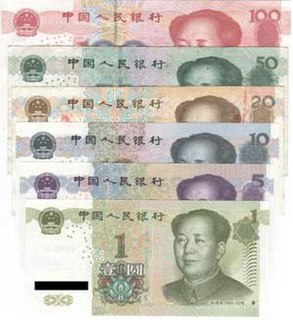
The renminbi is the official currency of the People's Republic of China and one of the world's reserve currencies, ranking as the eighth most traded currency in the world as of April 2019.

The Second Sino-Japanese War (1937–1945) was a military conflict that was primarily waged between the Republic of China and the Empire of Japan. The war made up the Chinese theater of the wider Pacific Theater of the Second World War. The beginning of the war is conventionally dated to the Marco Polo Bridge Incident on 7 July 1937, when a dispute between Japanese and Chinese troops in Peking escalated into a full-scale invasion. This full-scale war between the Chinese and the Empire of Japan is often regarded as the beginning of World War II in Asia.

Shenzhen, also known as Sham Chun, is a major sub-provincial city and one of the special economic zones of China. The city is located on the east bank of the Pearl River estuary on the central coast of southern province of Guangdong, bordering Hong Kong to the south, Dongguan to the north, and Huizhou to the northeast. With a population of 17.56 million as of 2020, Shenzhen is the third most populous city proper in China. Shenzhen is a global center in technology, research, manufacturing, business and economics, finance, tourism and transportation, and the Port of Shenzhen is the world's fourth busiest container port. As of 2020, the Shenzhen Bao'an International Airport, one of the three largest airport hubs serving the Guangdong-Hong Kong-Macau Greater Bay Area, is the 5th-busiest airports in the world, and the Futian Railway Station, one of the five main train stations in Shenzhen, is the world's second largest underground railway station.

Mohammed Aamir Hussain Khan is an Indian actor, film director, producer who works in Hindi films. Through his career spanning over 30 years, Khan has established himself as one of the most popular and influential actors of Indian cinema. Khan is the recipient of numerous awards, including nine Filmfare Awards, four National Film Awards, and an AACTA Award. He was honoured by the Government of India with the Padma Shri in 2003 and the Padma Bhushan in 2010, and received an honorary title from the Government of China in 2017.

Xi Jinping is a Chinese politician who has been serving as General Secretary of the Chinese Communist Party (CCP) and Chairman of the Central Military Commission (CMC) since 2012, and President of the People's Republic of China (PRC) since 2013. Xi has been the paramount leader of China, the most prominent political leader in the People's Republic of China, since 2012.
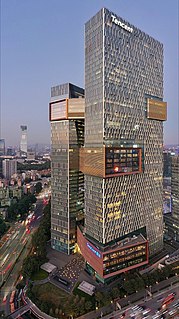
Tencent Holdings Ltd., also known as Tencent (腾讯), is a Chinese multinational technology and entertainment conglomerate and holding company headquartered in Shenzhen. It is also the largest company in the video game industry in the world based on its investments, with Tencent Games being its subsidiary focused on publishing of games.

Beijing, alternatively romanized as Peking, is the capital of the People's Republic of China. It is the world's most populous national capital city, with over 21 million residents within an administrative area of 16,410.5 km2. Nevertheless its built-up area, the third largest in China after Guangzhou and Shanghai, is slightly bigger, including 3 districts in Hebei being conurbated but with Miyun and Pinggu Districts in Beijing not agglomerated yet. It is located in Northern China, and is governed as a municipality under the direct administration of the State Council with 16 urban, suburban, and rural districts. Beijing is mostly surrounded by Hebei Province with the exception of neighboring Tianjin to the southeast; together, the three divisions form the Jingjinji megalopolis and the national capital region of China.
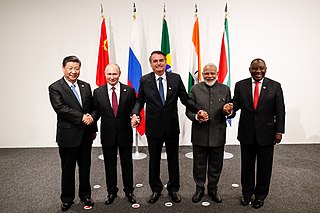
BRICS is the acronym coined to associate five major emerging economies: Brazil, Russia, India, China, and South Africa. The BRICS members are known for their significant influence on regional affairs. Since 2009, the governments of the BRICS states have met annually at formal summits. India hosted the most recent 13th BRICS summit on 9 September 2021 virtually.

The Chinese government has committed a series of ongoing human rights abuses against Uyghurs and other ethnic and religious minorities in Xinjiang that is often characterized as genocide. Since 2014, the Chinese government, under the administration of Chinese Communist Party (CCP) General Secretary Xi Jinping, has pursued policies that incarcerated more than an estimated one million Turkic Muslims in internment camps without any legal process. This is the largest-scale detention of ethnic and religious minorities since World War II. Thousands of mosques have been destroyed or damaged, and hundreds of thousands of children have been forcibly separated from their parents and sent to boarding schools.

The COVID-19 pandemic, also known as the coronavirus pandemic, is an ongoing global pandemic of coronavirus disease 2019 (COVID-19) caused by severe acute respiratory syndrome coronavirus 2 (SARS-CoV-2). The novel virus was first identified from an outbreak in the Chinese city of Wuhan in December 2019, and attempts to contain it there failed, allowing it to spread across the globe. The World Health Organization (WHO) declared a Public Health Emergency of International Concern on 30 January 2020 and a pandemic on 11 March 2020. As of 19 March 2022, the pandemic had caused more than 468 million cases and 6.07 million deaths, making it one of the deadliest in history.




















